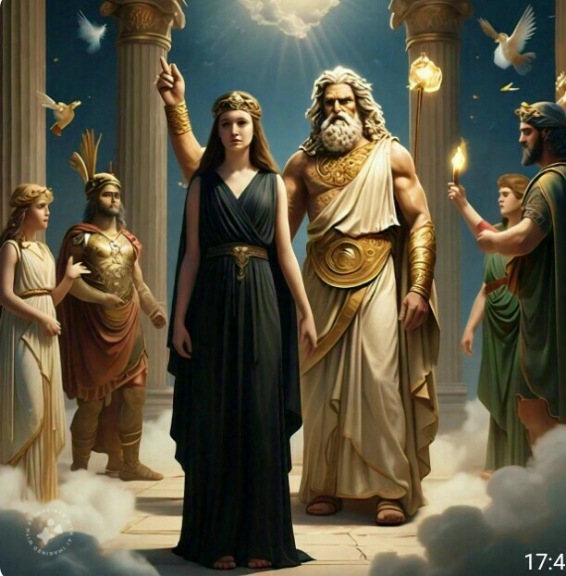 5
5
Epic of Sikinati: The Demi-Goddess
In a world where the skies whispered secrets and the earth trembled beneath the footsteps of the divine, there lived a young woman named Sikinati. She was no ordinary mortal; her birth was heralded by a comet streaking across the heavens, and her first breath brought forth a gust of wind that swept through the valley where she was born. Sikinati believed herself to be a demi-goddess, a being of both mortal and divine essence, destined to walk the line between the earthly realm and the gods.
From a young age, Sikinati demonstrated powers that astounded the people of her village. She could heal the sick with a touch, summon fire with a word, and move objects with the flick of her hand. Her most awe-inspiring feat came on the day a great tragedy struck. A passenger airplane, crippled by mechanical failure, plummeted from the sky. Witnesses on the ground screamed in horror as it descended, but Sikinati, with a heart full of courage and hands aglow with divine light, leaped into the air. With her hands outstretched, she caught the falling plane, cradling it in her arms as though it were a child. Gently, she lowered it to the ground, saving hundreds of lives and cementing her place in the hearts of the people.
But with the adulation came expectations, and Sikinati's journey had only just begun.
That year, a terrible drought struck the land. The once fertile fields turned to dust, rivers ran dry, and the people cried out in desperation. Sikinati, confident in her powers, stood atop the highest hill and commanded the skies to open. But the heavens remained silent, and the clouds refused to gather. Day after day, she tried, pouring her heart and soul into the attempt, but the rain would not fall. Her failures weighed heavily on her, yet she did not give up.
Then came the outbreak—a pestilence that swept through the land like a shadow, taking the lives of many. The people turned to Sikinati, begging her to stop the disease, to save their loved ones. She tried to harness her powers to heal the afflicted, but her efforts were in vain. The plague was relentless, and no matter how hard she fought, it claimed more and more lives. Anger and fear spread among the people. They began to doubt her divinity, turning instead to other gods, offering sacrifices in the hopes of salvation. But none of it mattered—the drought persisted, and the plague continued its grim march.
Sikinati, heartbroken and desperate, sought guidance. In a vision, she saw a place beyond the mortal realm, a land where the gods resided. Believing this was her only hope, she set out on a perilous journey to the divine realm, determined to seek help from the gods themselves.
After weeks of travel through treacherous mountains and across endless deserts, Sikinati arrived at the Gates of Eternity, the entrance to the land of the gods. There, she encountered Hanokim, the god of the earth, a being of immense power and ancient wisdom. She pleaded with him for assistance, explaining the plight of her people. Hanokim, moved by her determination, agreed to help. He summoned the winds and called forth the rain, but his efforts, too, were in vain. The drought and the plague were beyond even his considerable powers.
"It is not within my domain to end this suffering," Hanokim told her gravely. "You must seek the aid of Zeus, king of the gods, for only he can bring rain to the parched earth and cleanse it of disease."
Undeterred, Sikinati continued her journey, traveling to the peak of Mount Olympus to seek an audience with Zeus. She found him seated on his throne, the sky darkened with storm clouds that rumbled ominously. But to her dismay, Zeus was not the mighty ruler she had expected. Weakened and weary from battles of his own, he confessed that he was not in a condition to help her.
"You must go to Asgard and seek Odin, the Allfather," Zeus advised. "He holds the wisdom of the ages and may yet find a way to save your people."
Sikinati journeyed to Asgard, the realm of the Norse gods, where she found Odin in his grand hall, contemplating the mysteries of the universe. Odin, with his one piercing eye, listened to Sikinati's plea and pondered her situation.
"I am not the one you seek," Odin finally said. "But my son, Thor, god of thunder, can bring the rain and end the plague. Seek him out, and he will aid you."
Hope rekindled, Sikinati sought out Thor, traveling to the farthest reaches of Asgard. But when she found him, her heart sank. Thor, the mighty warrior, was slumped over in a drunken stupor, surrounded by empty mugs and the remnants of a feast. He was in no state to wield his hammer, let alone command the storms.
Crushed by disappointment, Sikinati realized that the gods, powerful though they were, could not provide the answers she sought. She returned to her homeland, exhausted and disillusioned, ready to face the harsh reality of failure.
But as she descended from the mountains and entered the valley once more, she was greeted by a sight that left her speechless. The once barren fields were now lush and green, the rivers flowing with crystal-clear water. The rains had come, and the land had been restored. The plague had ended, its grip on the people broken. Confused and bewildered, Sikinati sought answers from the villagers.
"It has been three years since you left, Sikinati," they told her. "The rains began shortly after you departed, and the plague subsided soon after. We thought you had brought us salvation from afar."
Three years? Sikinati was stunned. What had felt like mere weeks in the realm of the gods had been years in the mortal world. The drought had ended, not through the intervention of the gods she had sought, but through the passage of time and the resilience of the land and its people.
Sikinati realized then that her journey had not been in vain. The trials she had faced, the gods she had encountered, had taught her a valuable lesson. The power to change the world did not lie solely in the hands of the gods or demi-gods, but in the strength, endurance, and hope of those who lived in it.
Her faith in herself had wavered, but it was the faith of her people that had seen them through the darkest of times. Sikinati returned to her village, no longer as the demi-goddess they had once worshipped, but as one of them—a symbol of hope, perseverance, and the belief that even in the absence of divine intervention, humanity could endure and thrive.
And so, the legend of Sikinati, the woman who sought the help of gods and found it within herself, lived on, a tale of epic proportions told around the fires for generations to come.



 5
5

